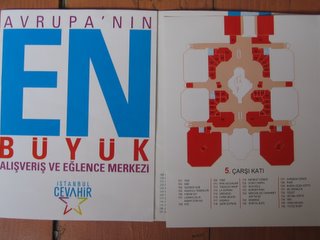Who Is Doing All That Shopping?
According to the travel guide, Time Out, Istanbul, “residents of Istanbul only had to wait slightly over 520 years between the opening of the city’s first mall and its second.” The first mall is the still thriving grand bazaar, a unique shopping experience that draws both locals and foreigners alike. However, with the advent of its second mall, The Galleria, in 1988, Istanbul’s shopping experience changed forever. Since 1988, a half-dozen major malls have opened, replete with international chain stores such as The United Colors of Benetton and Zara, and of course the requisite food court. The most recent of these malls, Cevahir, is a 6-story behemoth, claiming to be the largest mall in Europe.
 (A mall guide. The front cover reads "Europe's biggest shopping mall." The opposing page is the map of the 5th floor.)
(A mall guide. The front cover reads "Europe's biggest shopping mall." The opposing page is the map of the 5th floor.)
The interesting thing about shopping in Istanbul is that it is not cheap. Shoes and electronics, for one, are far more expensive than they are in the U.S. Combine that fact with the truism of “life is very difficult is Istanbul” that one often hears, one begins to wonder who has the money to do all this shopping? I have not heard yet of a well-paid Istanbullu, though they certainly must exist. Teaching English is supposedly one of the better jobs, though the teachers I know aren’t able to go on any shopping sprees. A Turkish girl whom I know was lucky to get a job that requires 50 hours a week and pays the equivalent of $600 a month. Employees at Burger King reportedly make 1.80 lira an hour (roughly $1.40), and minimum wage supposedly hovers between 280-450 lira ($220-315) a month. This is for a city that makes the cut for the world’s 50 most expensive cities…
My guess is that in Istanbul, as in the states, those working in banks or big multi-national corporations have the stability and salary to warrant trips to Cehavir. What is clear is that a certain, and seemingly growing, portion of Turkey’s elite can afford to pay high prices and chooses to do so. How this disparity will affect the social and political dynamic remains to be seen.
 (A mall guide. The front cover reads "Europe's biggest shopping mall." The opposing page is the map of the 5th floor.)
(A mall guide. The front cover reads "Europe's biggest shopping mall." The opposing page is the map of the 5th floor.)The interesting thing about shopping in Istanbul is that it is not cheap. Shoes and electronics, for one, are far more expensive than they are in the U.S. Combine that fact with the truism of “life is very difficult is Istanbul” that one often hears, one begins to wonder who has the money to do all this shopping? I have not heard yet of a well-paid Istanbullu, though they certainly must exist. Teaching English is supposedly one of the better jobs, though the teachers I know aren’t able to go on any shopping sprees. A Turkish girl whom I know was lucky to get a job that requires 50 hours a week and pays the equivalent of $600 a month. Employees at Burger King reportedly make 1.80 lira an hour (roughly $1.40), and minimum wage supposedly hovers between 280-450 lira ($220-315) a month. This is for a city that makes the cut for the world’s 50 most expensive cities…
My guess is that in Istanbul, as in the states, those working in banks or big multi-national corporations have the stability and salary to warrant trips to Cehavir. What is clear is that a certain, and seemingly growing, portion of Turkey’s elite can afford to pay high prices and chooses to do so. How this disparity will affect the social and political dynamic remains to be seen.

0 Comments:
Post a Comment
<< Home